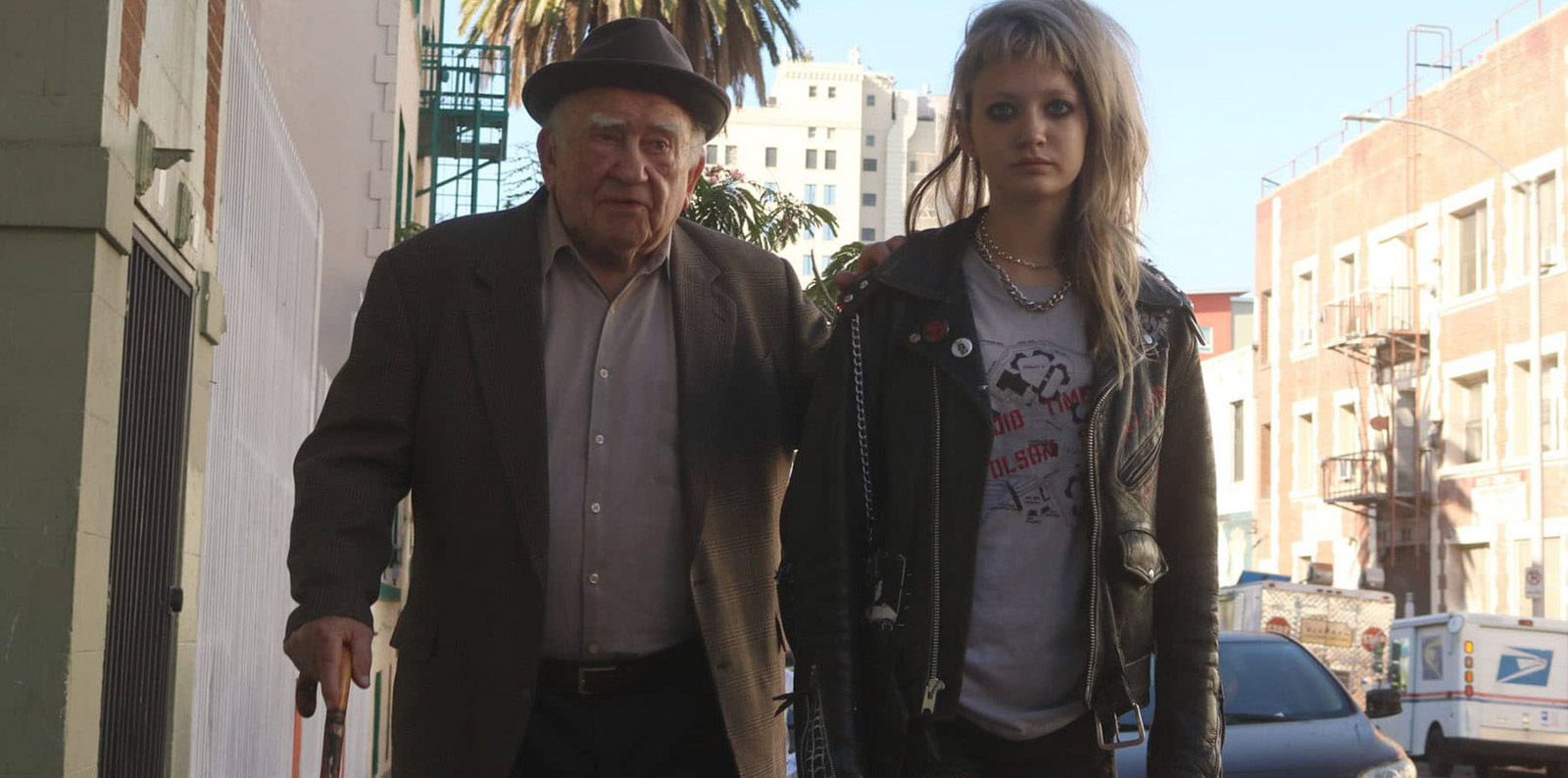Movie Info
Movie Info
- Director
- Rafal Zielinski
Relevant Quotes
“He has put my family far from me,
and my acquaintances are wholly estranged from me.
Two are better than one because they have a good reward for their toil. 10 For if they fall, one will lift up the other, but woe to one who is alone and falls and does not have another to help.
The spirit of the Lord God is upon me
because the Lord has anointed me;
he has sent me to bring good news to the oppressed,
to bind up the brokenhearted,
to proclaim liberty to the captives
and release to the prisoners...
It is good to see that actor Ed Asner’s last film was one decrying ignorance and advocating love, forgiveness and friendship. Although made three years ago, its message is even more relevant and necessary today as the dark forces of anti-Semitism and related prejudices make use of the Internet o spread their poison.
In Ohio the Goth-clothed Casey (Margot Josefsohn), with her nose ring, does not fit in at her high school, always getting into scrapes. Her home life is a mess, with her negligent mother Marge (Erica Piccininni) so engaged with her volatile live-in boyfriend (Jonathan Brooks) that she pays no heed to Casey’s complaints of his attempted sexual abuse. The teenager’s main escape is her artwork, her notebook filled with colorful sketches. Another escape is the nightspot where heavy metal bands perform and she can engage in soulless dancing. One night a prankster spray paints a swastika on the back of her black lather jacket, but when she angrily confronts the painter, he says it doesn’t mean anything.
Meanwhile, out in California the elderly Samuel (Asner) goes through his daily rituals of rising, getting groomed and dressed, and visiting his wife’s grave where he places a small stone on her tombstone. A cane in hand, he walks with the tentativeness of the aged, well aware that a fall could be a mortal danger. An observant Jew, he often visits his synagogue to pray and meditate with a prayer book. He is a Holocaust survivor who lives alone and has no close friends.
Fed up with her mom’s boyfriend, Casey leaves home to join up with her father in California, even though he has remarried and has three daughters by his second wife. As she is about to come out of the train station’s rest room, she overhears her father and stepmother talking, the gist of their conversation being that the wife is unhappy about taking her in. She waits until they leave the terminal, takes just a few clothes out of her suitcase, stuffs them into her knapsack, and walks out into the street. Then while eating some street food, a thief snatches her pack and is able to outrun her. With no money left, she is homeless.
The next day Samuel is again visiting his wife’s grave when he sees the girl, sound asleep among the tombstones. The sight of the swastika on her jacket so repels him that he gets up and leaves. However, his apparent concern for the homeless girl overcomes his disgust, and he slowly makes his way back to her side. He waits patiently for her to wake up, and when she fearfully and accusingly asks who he is, he replies that he is “Nobody much.” Her fears calmed, she accepts his invitation to a meal, she being so hungry that she accepts his offer of a second cheeseburger. She hesitates out of suspicion when he offers her the use of his shower to clean up, but at last accepts. Thus begins an unlikely generation that spans the generations, though several months pass before they encounter one another again and their relationship can grow to a greater depth. During that interval the girl finds work in a massage parlor. She is required to dress in suggestive costumes, but she seems able to withstand the advances of her unsavory customers.
As the months pass Samuel becomes the girl’s mentor. At one point two members of his synagogue yell at the girl when they spot the Nazi emblem on her back. She explains to her benefactor that she does not hate Jews, that it is just a way of saying to the world, F**k you!” Samuel explains that the symbol is especially painful because of the six million Jews murdered in the Holocaust. Casey thinks she is correcting him by saying that there was no such thing, just a war in which some Jews died along with many others. She replies to Samuel’s question of who told her this that it was her mother. Samuel assures her that it is a lie. It was in Hitler’s Germany that his two children were murdered.
Later the two talk about fear. Casey says that she is not afraid of anything. Samuel says,“I fear you—I fear your ignorance, and not just that, but the ignorance all around.” Probably recalling her denial of the Holocaust, he says that ignorance can do so much damage. He also speaks of his wife who taught him that he must love and not hate. Aware of her lack of love for herself, he tells her that she is beautiful inside. And he gives the film its title when he advises her about the rage seething within her, “I would embrace the tiger.” She must take the tiger within and become its master. Tenderly, he speaks of their relationship as giving him a purpose, suggesting to her that they could be a family. “I choose you, and hope that you choose me.” That his sage advice is taking root we see when Casey takes a can of black spray-paint and covers over the swastika on hr jacket.
Samuel wants Casey to live with him and enroll in school, but the school authorities require parental permission and a signature, so that requires Casey to get in contact with her mother. Samuel goes with Casey, and on the train tells her, “God presented me with a challenge. If I could learn to forgive you, then perhaps I could learn to forgive all before I died.”
Once at school and she has replaced her Goth attire with normal top and jeans, Casey is befriended by fellow classmate Tony (Diego Josef), thus gaining one more person who contributes to her growing sense of self-worth and well-being. She needs this because of the brutality of the ignorant world that Samuel had feared. The story is dark, but Casey is fortunate to have encountered such a man as Samuel. He liberates her from ignorance, hatred, and self-loathing, enabling her to become the beautiful person she was created to be. Samuel is a wonderful embodiment of the words of Isaiah 61:1 and reiterated by Jesus at the synagogue at Nazareth. His age also reminded me of the Patriarch Abraham, both of them doing God’s will even at their advanced ages. That TV ad wherein the woman declares “Age is just a number” is true. The old man could have retreated from life to care for his own aches and pains, but his kindness led him back to the sleeping girl in the cemetery and wait for her to wake up and find out if he could help her.
Director Rafal Zielinski and screenwriter Gina Wendkos have given us a parable of love and friendship amidst a darkened world, so that I am reminded of the passage in the Gospel of John, “The light shines in the darkness, and the darkness has not overcome it.” The segments of the film are connected by colorful sketches, somewhat animated. Presumably by Casey, these seem to express her feelings and thoughts. There are some awkward places in the film, and we might think the resolution a bit too much simplified, but all in all, he performances of the two leads and its message make this a must-see film. Ed Asner is at his finest, injecting at times small bits of humor into his conversation. This is young Margot Josefsohn’s first film, but she manages to express well the sense of abandonment and rage, the latter residing in her like a tiger. This is a fitting film for Mr. Asner to bow out in, as well as a good one for Ms. Josefsohn to make her debut. This little film played for just one week in Cincinnati, so if it opens in your area, do not hesitate to go! I hope that it will soon be available in video format so that it can garner the audience it deserves.
This review will be in the August issue of VP along with a set of questions for reflection and/or discussion. If you have found reviews on this site helpful, please consider purchasing a subscription or individual issue in The Store.


